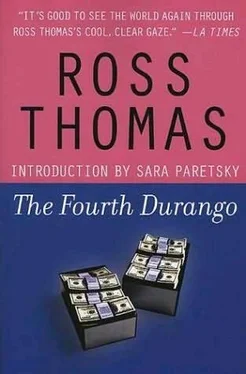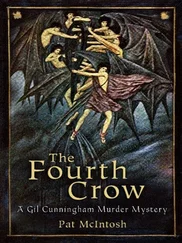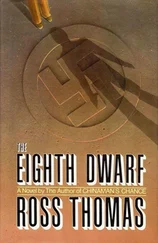Confident that she looked as if she were easily pushing forty, Dixie got out of the Cadillac and rang the bell twice, ignoring the engraved brass plate that asked visitors to please ring only once.
Now seated across the desk from Dr. David Pease, who wore a purple and orange Hawaiian shirt over white duck pants, Dixie Mansur said, “We were just stunned when we got that letter in Aberdeen from Dannie’s mama. Nelson and I had no idea.”
“Nelson is your husband, I believe.”
“Nelson Wigmore? Like I told you on the phone? In the oil business? With Oxy? That’s what we were doing in Aberdeen for four years.”
“In Scotland.”
Dixie pushed the tinted green glasses back up her nose. “Didn’t I say Scotland? I reckon I’m just used to everyone in the business knowing if you say Aberdeen, you mean Scotland and North Sea and not South Dakota. But anyway, Dannie’s mama is my Aunt Lena and Jack Adair’s my uncle, even if they are divorced and have been since way back in ’seventy-two. But this letter I got from Aunt Lena said she heard that Uncle Jack and Kelly Vines-who’s sort of my cousin by marriage?”
Dr. Pease nodded his understanding as Dixie pushed the glasses back up her nose.
“Well, she’d heard, Aunt Lena, I mean, that because of all that trouble Uncle Jack and Kelly had, they might not be able to afford to, well, you know, keep Dannie here any longer. So I talked to Nelson about it?”
“And what did he say?”
“And Nelson said, ‘Shoot, you tell ’em not to worry about their bill.’ So then I talked to you yesterday and you said it would cost six thousand a month? And Nelson said why don’t we just start taking care of it right now? So here I am and do you mind being paid in cash?”
“That’s quite acceptable, Mrs. Wigmore,” Dr. Pease said.
Dixie picked up a large woven-fiber purse from the floor and began rummaging through it, pausing three times to shove her glasses back up her nose. She finally found the envelope from Shearson Lehman Hutton addressed to Mr. Nelson Wigmore on Camden Drive in Beverly Hills. She slid the unsealed envelope across the desk to Dr. Pease, the address up. After he had glanced at the name and address and was looking inside, Dixie said, “Could I have that back, please?”
An almost startled Dr. Pease started to return the envelope. But Dixie shook her head. “Not the money, sugar; just the envelope. It’s got an address and a phone number I need on the back.”
Trying to remember the last time anyone had called him sugar, Dr. Pease removed the sixty hundred-dollar bills and handed back the envelope. Dixie tucked it into her large purse and said, “Would it be okay if I drop by on the fifteenth of each month, a day or two either way, and maybe say hello to Dannie after I pay the bill?”
“Would you like to see her now?”
“Oh! Could I really?” Dixie said, pushing her glasses back up for what Dr. Pease estimated was the dozenth time. Dixie’s expression suddenly went from pleased to concerned. “You think she’ll know me? Aunt Lena says Dannie doesn’t even recognize Kelly or Uncle Jack.”
“Regardless of whether she recognizes you,” he said, “it might prove beneficial if you saw her.”
Dixie pushed the glasses up again. “You know, Dr. Pease, I was just thinking? What if I took Dannie out and bought her a chocolate sundae or something? Just for an hour or so? And the next time I’m here to, you know, pay the bill, maybe I could take her out for lunch and a little drive? That wouldn’t hurt anything, would it?”
Dr. Pease glanced at the money, looked up at Dixie and smiled. “I can’t say that it will help, Mrs. Wigmore. But I’m quite confident it won’t hurt anything.”
Pushing her glasses back up again, Dixie frowned, leaned forward and almost whispered, “She’s not, well, violent or anything, is she?”
“Of course not.”
“I didn’t think so.” Dixie sighed. “Dannie was always just the sweetest, gentlest thing you ever saw.”

Danielle Adair Vines finished her chocolate fudge sundae as Dixie turned into the motel that was just off U.S. 101 and near the Kanan Dume Road, which led to the ocean and Malibu.
“I thought we’d go in here an’ maybe look at television and have something cool to drink.”
“I’m terribly sorry,” Danielle Vines said, “but I don’t remember your name.”
“Betty.”
“Yes. Betty. Right.”
“And maybe a little later,” Dixie said as she pulled the Cadillac into the parking space in front of room 141, “we could call Jack and Kelly.”
“Who?”
“Jack Adair and Kelly Vines.”
“Oh, yes, of course. Mr. Adair. He’s very nice. But that Mr. Vines is such a silly man.”
After the gray Volvo sedan reached the fifth hairpin turn up on Garner Road, B. D.Huckins took a right into Don Domingo Drive and headed for Chief Sid Fork’s measle-white house at the end of the cul-de-sac.
It was Merriman Dorr, seated next to the mayor, whose pilot’s eye spotted the catastrophe first and said, “Hey, Sid. Somebody went and chopped down all your cactuses.”
Sid Fork shot forward in the backseat, staring with disbelief through the windshield at his twelve immense, if ailing, saguaro cacti that had been felled, obviously by a chain saw, leaving a dozen one-foot-high stumps.
“Son of a bitch,” Fork said, much as he might say a prayer.
“Now who the hell’d want to do something like that?” Dorr asked.
Neither Huckins nor Fork replied as the mayor turned slowly into the chief’s driveway and stopped, but kept the Volvo’s engine running.
“Stay here a minute,” Fork said, getting out of the sedan’s rear, taking his time, a.38 Smith & Wesson Bodyguard Airweight revolver now in his right hand. He strolled past the felled cacti without a glance, keeping his eyes on the front door of his house.
When he reached the door he found it had been left slightly ajar. Fork stepped back and kicked it open, flattening his back against the brick wall on the right. He waited almost a full minute, the revolver pointed up and held in a two-handed grip. When nothing happened, he ducked through the open door in a crouch and disappeared from view.
Fork reappeared two minutes later with a stricken expression and his revolver dangling, apparently forgotten, at his right side. With his left hand he made a curiously defeated gesture that beckoned Huckins and Dorr.
The first thing they saw when they entered the living room was the far wall. All the framed pictures had been stripped from it and dropped to the floor where someone had apparently jumped up and down on them. Spray-painted on the wall was a greeting that read, “Snout says Hi!”
The mayor inspected the rest of the living room, saw nothing else that had been vandalized and said, “This it?”
Fork shook his head. “The big bedroom.”
Followed by Dorr, the mayor went down the short hall and into the larger of the two bedrooms that housed the Fork Collection of American Artifacts. The sixty-two pre-1941 Coca-Cola bottles were all smashed. The ninety-four varieties of “I Like Ike” campaign buttons had been dropped to the floor and pounded with something, possibly a hammer. The last editions ever printed of the extinct magazines had been ripped apart. Maple syrup had been poured over the mounted barbed-wire display. All of the glass insulators, Fork’s special pride, had been smashed.
“Jesus,” Dorr said and again asked, “Who’d want to do this?”
“Kids probably,” Huckins said. “During the parade when none of the neighbors were home.”
Читать дальше













